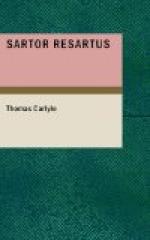Here, however, may be the place to state that, in much of our Philosopher’s history, there is something of an almost Hindoo character: nay perhaps in that so well-fostered and every way excellent “Passivity” of his, which, with no free development of the antagonist Activity, distinguished his childhood, we may detect the rudiments of much that, in after days, and still in these present days, astonishes the world. For the shallow-sighted, Teufelsdrockh is oftenest a man without Activity of any kind, a No-man; for the deep-sighted, again, a man with Activity almost superabundant, yet so spiritual, close-hidden, enigmatic, that no mortal can foresee its explosions, or even when it has exploded, so much as ascertain its significance. A dangerous, difficult temper for the modern European; above all, disadvantageous in the hero of a Biography! Now as heretofore it will behoove the Editor of these pages, were it never so unsuccessfully, to do his endeavor.
Among the earliest tools of any complicacy which a man, especially a man of letters, gets to handle, are his Class-books. On this portion of his History, Teufelsdrockh looks down professedly as indifferent. Reading he “cannot remember ever to have learned;” so perhaps had it by nature. He says generally: “Of the insignificant portion of my Education, which depended on Schools, there need almost no notice be taken. I learned what others learn; and kept it stored by in a corner of my head, seeing as yet no manner of use in it. My Schoolmaster, a down-bent, broken-hearted, underfoot martyr, as others of that guild are, did little for me, except discover that he could do little: he, good soul, pronounced me a genius, fit for the learned professions; and that I must be sent to the Gymnasium, and one day to the University. Meanwhile, what printed thing soever I could meet with I read. My very copper pocket-money I laid out on stall-literature; which, as it accumulated, I with my own hands sewed into volumes. By this means was the young head furnished with a considerable miscellany of things and shadows of things: History in authentic fragments lay mingled with Fabulous chimeras, wherein also was reality; and the whole not as dead stuff, but as living pabulum, tolerably nutritive for a mind as yet so peptic.”
That the Entepfuhl Schoolmaster judged well, we now know. Indeed, already in the youthful Gneschen, with all his outward stillness, there may have been manifest an inward vivacity that promised much; symptoms of a spirit singularly open, thoughtful, almost poetical. Thus, to say nothing of his Suppers on the Orchard-wall, and other phenomena of that earlier period, have many readers of these pages stumbled, in their twelfth year, on such reflections as the following? “It struck me much, as I sat by the Kuhbach, one silent noontide, and watched it flowing, gurgling, to think how this same streamlet had flowed and gurgled, through all changes of weather and of fortune, from beyond




